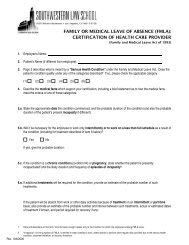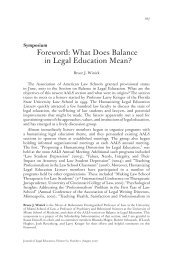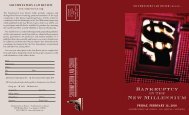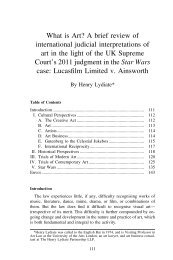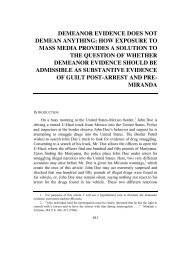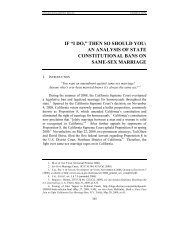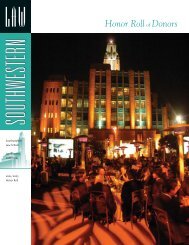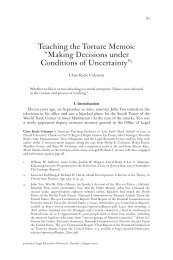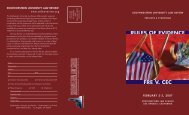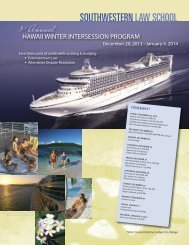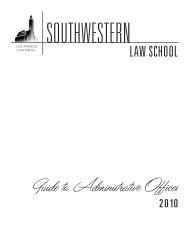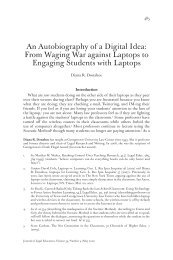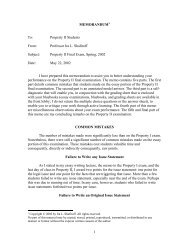S:\Externship Forms Revised May 2005\EXTERN POLICIES ...
S:\Externship Forms Revised May 2005\EXTERN POLICIES ...
S:\Externship Forms Revised May 2005\EXTERN POLICIES ...
Create successful ePaper yourself
Turn your PDF publications into a flip-book with our unique Google optimized e-Paper software.
SOUTHWESTERN UNIVERSITY SCHOOL OF LAW<br />
EXTERNSHIP PROGRAM <strong>POLICIES</strong><br />
& GUIDELINES<br />
I. Purpose of Program<br />
In an effort to offer exceptional and diversified educational programs, Southwestern has developed a select<br />
number of off-campus placements, primarily with public agencies, public interest law firms, and state and<br />
federal judges. Placements are arranged to supplement the academic program. Students are permitted to<br />
experience the attorney's role directly through application of legal theory to actual cases, thereby gaining<br />
greater insight into the operation of law and legal systems. Stated simply, externships are an opportunity to<br />
put legal knowledge to work and to acquire lawyering skills in a real, as opposed to "moot" environment.<br />
II.<br />
General Requirements<br />
A. Curriculum Relationship: All externship programs will relate to the general law curriculum<br />
offered at Southwestern.<br />
B. Grading: All externships are graded Credit/No Credit.<br />
C. Unit Credit - Part-time Placements<br />
Regular Session: Part-time non-judicial externship placements are for 3 units of credit.<br />
Part-time judicial externships are for 4 units of credit.<br />
Summer Term: All part-time summer externships are for 2 or 3 units of credit. Four (4) unit<br />
externships are available during the summer session at the discretion of the Director of Externships.<br />
Students may not register for a 4 unit externship without prior approval of the Director.<br />
D. Unit Credit - Full-time Placements<br />
Full-time externships are for 10 units of credit (5 units for summer externships). Full-time<br />
externships are normally limited to judicial externships. All other requests for full-time externships<br />
will be considered on a case-by-case basis by the Director of Externships.<br />
E. Compensation<br />
It is the law school's policy not to mix monetary compensation with unit credit. As discussed below,<br />
because the law school looks to the field placement supervisor to function as a law teacher, injecting<br />
the factor of wages can distort an otherwise beneficial teacher-student relationship. Therefore,<br />
students may not accept monetary compensation for externship work. Where it is the practice of host<br />
agencies to pay an appropriate cost of living stipend for an externship, the extern may receive the<br />
stipend on the prior written approval of the Director of Externships.
Page 2<br />
F. Eligible Programs<br />
Permanent, on-going programs for student externship placements should be the norm. Temporary,<br />
one-time programs should not be approved for inclusion in Southwestern's externship program.<br />
Eligible programs should be administered by public agencies, courts, or not-for-profit entities.<br />
Placement of students in externship programs operated by profit-making enterprises should be<br />
allowed only to take advantage of particular opportunities that cannot otherwise be duplicated by<br />
placement in not-for-profit enterprises.<br />
III.<br />
Student Eligibility & Requirements<br />
A. Academic Standing: Students must be in good academic standing in the semester preceding their<br />
participation in the externship program and in the semester they participate in the externship.<br />
Additionally, first year day or first or second year evening or PLEAS students whose cumulative<br />
grades at the end of the Fall semester are at or below a 2.30 GPA are not permitted to enroll in an<br />
externship during the summer following that Fall semester. Second year day or second or third year<br />
evening or PLEAS students whose cumulative grades at the end of the Fall semester are at or below a<br />
2.30 GPA are not permitted to enroll in a second externship during the summer following that Fall<br />
semester.<br />
In addition, students wishing to participate in certain judicial externships must be in the top 30% of<br />
their class in the semester preceding their participation in the externship.<br />
B. Unit Credit and Length of Program<br />
Students may enroll for a maximum of 6 units of externship credit and may not take more than 11<br />
units of credit/no credit (i.e., Moot Court, Law Review, Law Journal, ITAP, Trial Advocacy,<br />
Externship), excluding those earned by transfer credit courses taken at another law school. The<br />
placement of a student in a full-time judicial externship will invariably exceed the credit/no credit<br />
limitation. Waivers, on a case-by-case basis, may be granted to accommodate such placements.<br />
Students must complete their externship in the semester or term they begin. Students may participate<br />
in more than one externship, subject to the unit limitation, but students may not repeat placements in<br />
the same program. A student who has failed to complete an externship program or who receives a<br />
grade of No Credit shall not be permitted to enroll in another externship.<br />
C. Student Application<br />
Students may apply for an Externship Program placement by filling out the Externship Application<br />
Form available in the Externship Office, Room W231. The completed Application and three (3)<br />
copies of a current resume must be returned to the Externship Office, Room W231. Students<br />
applying for a judicial externship must also submit a writing sample with their application (some<br />
non-judicial placements also require a writing sample, i.e., United States Attorney’s Office).
Page 3<br />
Students should begin the application process no later than:<br />
1. September 15 for Spring placements.<br />
2. February 1 for Summer placements.<br />
3. March 1 for Fall placements.<br />
[Note: Judicial externships are highly competitive. Students are encouraged to submit<br />
applications for judicial externships up to six months in advance.]<br />
Some federal placements require a security clearance a process which may take up to 6<br />
months. Therefore early planning and submission of application is necessary.<br />
The above timetable is important for several reasons:<br />
First: many externship placements are competitive. Students who delay applying may find their<br />
primary placement preferences already filled.<br />
Second: externship placements require an interview with the placement supervisor prior to<br />
placement. Early application enables the student to schedule an interview with minimum disruption<br />
of other commitments.<br />
Third: Trial placements, such as in the District Attorney's Office, require certification by the State<br />
Bar. The certification process takes approximately 4-6 weeks. Students may not be able to fully<br />
participate in the program until certification is approved by the State Bar.<br />
D. Hours per Unit/Scheduling Hours<br />
Students on part-time externships during the Fall and Spring semesters shall devote a minimum of 5<br />
hours per week per unit for the externship placement. Thus a 3 unit placement requires a minimum<br />
of 15 hours per week (225 hours per semester). Due to the compression of the summer session<br />
schedule, summer externships require 9 hours per week per unit (144 hours per session for a 2 unit<br />
placement; 216 hours per session for a 3 unit placement). Students on full-time placements shall<br />
devote at least 40 hours per week to the externship. Hours are computed on the basis of a 15 week<br />
regular semester and an eight week summer session.<br />
Students shall arrange with their placement supervisor a schedule for performance by the student of<br />
their externship responsibilities. Students are expected to abide by their schedule. Gross,<br />
unauthorized deviations from the schedule shall be cause for termination of the externship or for<br />
assignment of a failing grade or both. Authorization for deviations from approved schedules require<br />
the consent of the placement supervisor and the Externship Director. WHERE STUDENTS HAVE<br />
REQUESTED AND RECEIVED PERMISSION TO TAKE A COURSE(S) IN ANOTHER<br />
PROGRAM (i.e., day students in night program) DUE TO CONFLICTS BETWEEN THEIR<br />
EXTERNSHIP SCHEDULE AND THE DAY CURRICULUM, APPROVAL BY THE DIRECTOR<br />
OF EXTERNSHIPS IN CONJUNCTION WITH THE DEAN OF STUDENTS, IS REQUIRED<br />
PRIOR TO ANY CHANGE IN SCHEDULE.
Page 4<br />
E. Placement Requirements: Externs must comply with all working hours requirements and<br />
conditions imposed by the placement.<br />
Students must arrive for work and remain with the placement according to the dates and times<br />
specified by the program. (Generally, from the first day of instruction through the last day of<br />
instruction of the semester or session.)<br />
All requirements regarding reports and papers for each program must be met by the student in order<br />
to receive credit.<br />
F. Placement Interview: All externship placements require that the student be interviewed by the<br />
placement supervisor. Interviews will be scheduled by Southwestern, working with each student.<br />
Upon being scheduled for one or more interviews, it is expected that the student will complete the<br />
interview, accept the position if offered, and arrange an appropriate work schedule for the semester.<br />
Once a student accepts an externship, it is expected that the student will successfully complete the<br />
required hours of the externship. Any change of plans or complications, at any time, should be<br />
reported immediately to the Director of Externships or Externship Office.<br />
IV.<br />
Standards for Selection of Students for Externships<br />
No student has a right to participate in Southwestern's Externship Program. All externship placements are at<br />
the discretion of the Director of Externships. In exercising that discretion, the following factors will be<br />
considered:<br />
A. Ability to do the work required: Does the student have the necessary legal, professional and<br />
intellectual skills In making this determination, the Law School transcript will be examined, but it<br />
shall not necessarily be conclusive.<br />
B. Dependability and reliability: Is the student dependable and reliable Will the student make the<br />
best use of the opportunity Can the student be counted on to do his or her share of the work in the<br />
office<br />
C. Commitment: Will the student fit into the operation of the host agency Will the student be able to<br />
get along with people in the office to which he or she is assigned<br />
E. Reason for wanting to participate in the program: Does the program fit into the long-range plans<br />
and interest of the student or is it just an opportunity to escape from law school or from taking a<br />
course<br />
F. Compliance with Prerequisite of Program: Has the student complied with all placement<br />
prerequisites
Page 5<br />
V. Externship Placements<br />
A. Program Selection and Approval: The Externship Program Policies and Guidelines: Placement<br />
Descriptions is a separate booklet, available at the Externship Office (W231), which contains a list of<br />
approved placements. Approved placements are those that are compatible with the goals of<br />
Southwestern's Externship Program, which are:<br />
(1) To maximize a student's primary responsibility for the handling of an actual case or<br />
controversy; and<br />
(2) Whenever possible, to permit direct client contact and court appearances on cases.<br />
(3) To afford students an opportunity to put the legal knowledge they have gained from the<br />
instructional program to work in actual cases and controversies.<br />
(4) To provide students with the opportunity to observe the actual practice of law.<br />
(5) To provide students with structured supervision in a real work environment.<br />
Every effort is made to insure that the student gets a structured exposure to a range of lawyering skills,<br />
including the opportunity personally to interview, investigate, negotiate, draft legal documents, conduct legal<br />
proceedings, etc. An Externship is not just an ordinary research clerk position, i.e., performing tasks for<br />
which the students should be getting paid a salary or wage. Nor should it be viewed as a way of "buying<br />
credits" so as to avoid course work or accelerate graduation. Rather, it should be viewed as an opportunity<br />
for students to assume professional responsibility and decision making in the legal area encompassed by the<br />
field placement. To this end, each placement is regularly screened to insure that:<br />
a. The field placement office or agency has sufficient staff resources to assign students<br />
to a particular attorney for supervision;<br />
b. The supervising attorney or judicial officer is aware of his or her supervisory<br />
responsibilities, including assisting the student in preparing assigned tasks and<br />
observing and critiquing the subsequent student performance; and<br />
c. The supervising attorney or judicial officer will complete a detailed evaluation of the<br />
overall student performance at semester's end, including a verification of the<br />
accuracy of the student's time sheets.<br />
VI.<br />
Student Requirements After Acceptance of a Placement<br />
A. Acceptances<br />
ONCE A STUDENT ACCEPTS AN OFFER, IT IS THE STUDENT'S RESPONSIBILITY TO<br />
CONTACT ALL OTHER CHAMBERS AND/OR AGENCIES TO WHICH HE/SHE HAS<br />
APPLIED FOR AN EXTERNSHIP AND WITHDRAW THE APPLICATION. THIS IS A<br />
MUST, EVEN IF THERE HAS BEEN NO RESPONSE TO THE APPLICATION.
Page 6<br />
A student must advise the Director of Externship or the Externship Office of acceptance of an offer.<br />
If a student is selected for an externship and accepts the offer, he or she will not be able to withdraw<br />
the commitment except for compelling reasons. To obtain permission for withdrawal, the student<br />
must immediately, upon knowledge of such compelling reasons, petition in writing to the Director of<br />
Externships prior to commencement of the externship. The petition must specify the compelling<br />
reasons for withdrawal. Failure to petition and receive approval may jeopardize the student's chances<br />
of being considered for a future externship placement. Under no circumstances will a student be<br />
allowed to withdraw an acceptance to go to another placement.<br />
B. State Bar Certification<br />
Several placements require State Bar Certification, e.g. District Attorney's Office. Students should<br />
obtain from the Registrar's Office the "Certification Packet" and then take the necessary steps to be<br />
certified where pertinent to the individual placements. The instructions on the "Certification Packet"<br />
are self-explanatory.<br />
C. Hours and Schedules: See III D.<br />
D. Placement Requirements: See III E.<br />
E. Orientation/Guided Reflection/Faculty Advisors: All externs will be required to attend an<br />
orientation session before starting the externship. In addition, all externs will be required to<br />
participate in “Guided Reflection,” through the Externship Program’s TWEN page in the form of<br />
online submissions concerning their placement; these submissions will be supervised by Faculty<br />
Advisors.<br />
F. Work Product and Time Sheets: At regular intervals during the placement, the extern must submit<br />
time sheets signed by the placement supervisor, detailing the work done; and at the end of the<br />
placement, the extern also is required to turn in a Work Product Folder that contains copies of all<br />
significant completed work products (e.g., motions, memoranda or trial notebook). This Folder will<br />
be returned after review by the Externship Director. Work Product Folders and Final Time Sheets<br />
are due within 2 weeks of the last day of classes for the semester, or earlier as indicated on the<br />
Externship Syllabus and should be turned into the Externship Office, Room W231.<br />
G. Confidentiality: The student extern is expected to hold in strictest confidence all communications<br />
received in the course of the externship placement which are not matters of public record and to<br />
adhere fully to the standards of professional conduct set forth in the Code of Professional<br />
Responsibility of the American Bar Association and the Rules of Professional Conduct of the State<br />
Bar of California.<br />
VII.<br />
Grading & Evaluation<br />
A grade of Credit or No Credit is determined by the Director of Externships and in some cases the Faculty<br />
Advisor. The grade is based upon participation in the orientation and the Guided Reflection submissions, the<br />
work product, time sheets, the evaluation of the placement supervisor, and the student's compliance with all<br />
externship requirements.
Page 7<br />
Any student enrolled in an externship placement who fails to comply with any provisions of the Externship<br />
Program, of the Student Honor Code, or appropriate regulations governing the profession, may, at the<br />
discretion of the Director of Externships, be assigned a No Credit and be barred from further placements.<br />
VIII.<br />
NEW PROGRAMS<br />
The Externship Program is intended to provide benefits to students. Therefore, it is the policy of the law<br />
school to encourage the establishment of new programs that will enhance educational opportunities for<br />
students.<br />
New programs should, however, have the potential for continuation. Thus, one-time placements or short<br />
term programs will generally not be deemed suitable candidates for inclusion in Southwestern's Externship<br />
Program.<br />
STUDENTS ARE NOT PERMITTED TO SEEK OUT THEIR OWN PLACEMENT AND THEN<br />
REQUEST UNIT CREDIT. ALL REQUESTS FOR PLACEMENTS IN NEW PROGRAMS<br />
SHOULD BE DISCUSSED INITIALLY WITH THE DIRECTOR OF EXTERNSHIPS. THE<br />
STUDENT SHOULD BE PREPARED TO EXPLAIN WHY AN EXISTING, ESTABLISHED FIELD<br />
PLACEMENT CANNOT OTHERWISE FULFILL THE EDUCATIONAL OBJECTIVES SOUGHT.<br />
IX.<br />
PROGRAM EVALUATION<br />
A. Frequency: Every externship program should be thoroughly evaluated by a faculty member through<br />
periodic on-site visits or their equivalent.<br />
B. Responsibility: The Director of Externships shall be responsible for preparing the evaluation of<br />
each program and reporting the evaluation and recommendation to the Faculty.<br />
C. Evaluation: The evaluation of programs by the Director shall be based on the following:<br />
1) Recommendation of the Faculty Advisor;<br />
2) Recommendation of student participants;<br />
3) Reports and papers of student participants; and<br />
4) On-site inspections by the Director or other faculty representative.<br />
D. Criteria: The criteria for evaluation shall be as follows:<br />
1) How well the program meets the objectives for which it is established;<br />
2) The actual work of the students;<br />
3) How well the actual work of the students meets the educational goals of the program;<br />
4) The adequacy of the supervision by the faculty advisor and the supervising attorney;<br />
5) The adequacy of reports by the staff attorney;<br />
6) How well the program is integrated into the curriculum;<br />
7) The benefits to the students from the program; and<br />
8) The benefits to the law school from the program.
Page 8<br />
X. TERMINATION OF PROGRAM<br />
An externship placement may be terminated as an approved placement if, after a Program Evaluation, it is in<br />
the judgment of the Director of Externships unsuitable for continued placement of Southwestern students.<br />
All decisions to terminate any approved externship placement due to unsuitability shall be communicated to<br />
the faculty.<br />
A program may also be terminated if, within a two year period, no students have participated in an externship<br />
with the host agency, court, or firm.<br />
XI.<br />
ADMINISTRATION OF PROGRAM<br />
A. Director<br />
The Externship Program shall be directed by a full-time faculty member who shall report to the<br />
Dean.<br />
B. Administration<br />
The Externship Program shall be administered consistent with the rules and standards set forth in this<br />
booklet.<br />
C. Exemption & Waivers<br />
The Director of Externships shall have the power to waive or grant an exemption from any<br />
requirement contained herein.<br />
All requests for exemptions or waivers must be in writing and set forth the basis for the requested<br />
exemption or waiver. The decision of the Director of Externships whether to grant or deny an<br />
exemption or waiver shall be committed to the Director's discretion.<br />
EXTERNSHIP PROGRAM <strong>POLICIES</strong> & GUIDELINES: DESCRIPTIONS OF SELECT<br />
PLACEMENTS; VISIT THE EXTERNSHIP OFFICE FOR ADDITIONAL INFORMATION ON<br />
THESE AND OTHER PLACEMENTS.<br />
A. Judicial Externships<br />
The students enrolled in this program will be assigned to clerk for a judge of the Federal District<br />
Court, Federal Court of Appeals, a judge on a Superior or Appellate Court of the State or a United<br />
States Magistrate or Bankruptcy Judge.<br />
Students in this program must have completed civil and/or criminal procedure and must have<br />
completed three (3) semesters of instruction. Students who wish to be placed in certain judicial<br />
externships must be in the top 30%. Since the federal court calendar is heard on Monday mornings,<br />
applicants for positions on the Federal District Court should include that time as part of their<br />
anticipated scheduled hours.<br />
The judicial extern can expect to serve the judge in the same capacity as the law clerk. In this sense<br />
both extern and clerk are the judge's personal, legal assistant. Judicial externships offer special<br />
opportunities to observe the reality rather than the myth of the judicial process and to participate in
Page 9<br />
the process. Judicial externships may provide students with access to employment opportunities that<br />
previously were foreclosed. Employers tend to see externs as the product of merit selection and<br />
value the insights the former extern brings to the job.<br />
Students interested in judicial externships should be forewarned that the job, while outwardly<br />
glamorous, basically emphasizes research and writing. Externing for a judge is an exacting business<br />
and can be stressful. Externs are expected to perform at high levels of competency. Failure to<br />
perform at the expected high level can lead to a decision by the Director of Externships to withhold<br />
or reduce academic credit awarded for the externship.<br />
1. Federal Courts<br />
This externship provides the student the opportunity to learn about the operation of the federal<br />
judicial system.<br />
Federal Appellate Courts exercise a wide ranging jurisdiction. Students assigned to the Circuit Court<br />
of Appeals can expect to be assigned responsibility to work on several appeals during their<br />
externship.<br />
Externships with the Federal District Court, Magistrates, and Bankruptcy Judges tend to be more<br />
specialized. The Federal District Court is a trial court and externs will spend considerable time<br />
assisting the judge with the motion calendar. Externships with Magistrates will significantly parallel<br />
those at the District Court level. Bankruptcy practice is specialized. While externs spend substantial<br />
time assisting the judge with the motion calendar, the issues before the court emphasize commercial<br />
transactions.<br />
The bulk of the work in all federal judicial externships is taken up with research and the writing and<br />
rewriting of memoranda.<br />
2. California Court of Appeal<br />
Civil and criminal appeals of all types are handled by the Court, and the student becomes intimately<br />
involved in their resolution. Generally, the students are involved in the initial "work-up" of the<br />
appeal by briefing the case and preparing memos and making recommendations. The student will do<br />
research and be involved in assisting the justice assigned to write the opinion for the court.<br />
3. Superior Courts<br />
Although most of the placements made in the Superior Court will be in the Central District in<br />
downtown Los Angeles, a limited number of positions may be arranged in branch courts. The<br />
Superior Court is divided into departments specializing in particular areas of the law. Students may<br />
be assigned to work with judges in the areas of probate, family law, writs, etc. and receive an<br />
invaluable exposure to the judicial decision-making process, as well as experience in research and<br />
writing.<br />
Placements are also available with other Superior Court locations such as Orange, Riverside, San<br />
Bernardino and Ventura Counties.<br />
B. Los Angeles District Attorney<br />
Placements with the District Attorney's Office are available to a limited number of day students<br />
following commencement of their second year of law school (third year for evening and PLEAS
students) and thereafter. The course in Trial Advocacy is highly recommended for all students<br />
seeking placement with this office.<br />
1. Trials Division (Certified Law Student Program - 2 full days a week required)<br />
Page 10<br />
Students will be assigned to a Unit of the Felony Trials Division in the District Attorney's Office.<br />
Their work will concern all types of felony cases. Emphasis will be on trial work. Students may<br />
interview witnesses, assist in preparation of cases for trial and help prepare trial exhibits. Students<br />
who are certified under the Rules Governing the Practical Training of Law. Students will make court<br />
appearances under the supervision of an experienced Deputy. There will be opportunity to become<br />
familiar with the courtroom, the District Attorney's Office and all facets of felon processing.<br />
2. Juvenile Division<br />
The Juvenile Division of the Bureau of Special Operations is responsible for prosecuting those<br />
violations of the criminal law that are committed by persons seventeen years of age and under. These<br />
prosecutions take place in juvenile courts, all of which are Superior Courts.<br />
A proceeding in Juvenile Court is fundamentally a hearing to determine whether a juvenile, against<br />
whom a petition has been filed alleging the commission of a criminal act, should be made a ward of<br />
the court because the allegation is found true. Externs assigned to the Juvenile Division will engage<br />
in the same activities as described above with respect to the Trial Division.<br />
3. Appellate Division<br />
The Appellate Division of the Bureau of Special Operations makes legal appearance and files briefs<br />
in all California and federal courts.<br />
The Appellate Division represents the People when they appeal in felony matters. Members of this<br />
Division also appear in preconviction felony matters involving habeas corpus. Post conviction<br />
proceedings (including defendants' appeals from final judgments of conviction) relating to felony<br />
cases are usually processed by the Attorney General.<br />
In misdemeanor cases, this Division processes pre- and post-conviction matters arising out of cases<br />
prosecuted by the District Attorney.<br />
Appellate Division deputies also process some matters in the federal courts that arise out of state<br />
prosecutions. Additionally, members of the Division have been active in formulating legislation.<br />
Student externs will assist in the research and drafting of writs and appellate briefs.<br />
4. Career Criminal Unit<br />
This Unit was set up to accomplish the successful prosecution of dangerous, repeat offenders and to<br />
seek their incarceration for maximum state prison terms. The Unit concentrates on robbery and<br />
robbery-murder cases. When a case that merits the attention of the Career Criminal Unit is<br />
identified, an attorney from the Unit is assigned to handle the case from the beginning through<br />
sentencing. For this reason, a student extern in this office will be engaged in researching factual and<br />
legal issues and observing courtroom proceedings at all stages in a felony proceeding.<br />
5. Consumer and Environmental Protection Division<br />
The Consumer and Environmental Protection Division of the Bureau of Special Operations consists<br />
of two sections: Consumer Protection and Anti-Trust. The Division was formed in 1971. Its
Page 11<br />
purpose is to prosecute those consumer, environmental and anti-competitive violations that have a<br />
county-wide impact on the public.<br />
The Division operates almost exclusively in the civil courts. It seeks injunctive relief, civil penalties,<br />
restitution, or any other remedy that is necessary to correct a violation. Criminal cases are filed when<br />
necessary. The Consumer Protection Section operates primarily in the area of false advertising and<br />
unfair competition. The Anti-Trust Section, which was created in 1971, handles prosecutions of<br />
violations of the state's anti-trust statue, the Cartwright Act, when the violations occur primarily in<br />
Los Angeles County.<br />
Student externs will be given legal research and drafting assignments. From time to time, they may<br />
be involved in investigating and monitoring advertisements or in preparing legal opinions regarding<br />
such ads. Students applying for this position should have some knowledge of consumer law and a<br />
strong interest in the field.<br />
6. Special Units<br />
(a) Child Abuse and Domestic Violence Section<br />
The Child Abuse and Domestic Violence section was established to respond to complaints that<br />
prosecutors have been traditionally hesitant to file criminal charges in situations involving family<br />
violence. Attorneys involved in this program handle complex cases of violent crimes committed by<br />
married peoples against one another, child abuse, and violence between unmarried people living<br />
together. The Section is also available to assist other deputies in the office with advice and research.<br />
(b) Hardcore Gang Unit<br />
In 1979, the District Attorney's Office established a Hardcore Gang Unit to target prosecution of<br />
violent, habitual gang offenders. The Unit’s reach is county-wide and the Unit prosecutes in both<br />
adult and juvenile courts. Students will be involved in the cases on all levels, including<br />
investigation, filing, discovery, handling of motions, trial preparation, etc. Students who are certified<br />
pursuant to the Rules governing the Practical Training of Law Students may appear under the<br />
supervision of a Deputy. In order to obtain the most benefit from this placement, students must have<br />
mornings free to devote to this placement.<br />
C. Los Angeles County Public Defender<br />
The Office represents indigent criminal defendants and juveniles. Students are assigned primarily to<br />
the analysis of case files and the research and preparation of a wide range of motions regularly filed<br />
with the criminal courts (995 motions, motions to quash and traverse search warrants, to disclose<br />
informants' identities, to suppress confessions, etc.). Students are permitted to attend and participate<br />
in client interviews, including visits to the jail, and may occasionally accompany field investigators<br />
employed by the office.<br />
Students are not certified to make court appearances. They do, however, accompany deputies who<br />
are making appearances in arraignments through sentencing hearings.
Page 12<br />
D. Federal Public Defender<br />
This office represents indigent criminal defendants in federal court. Student assignments are similar<br />
to those encountered in the County Public Defender’s Office described above.<br />
Students are not certified to make court appearances.<br />
E. California Attorney General<br />
1. Criminal Appellate Division<br />
Students placed in the Los Angeles Criminal Division of the California State Attorney General assist<br />
in the writing of appellate briefs in criminal matters. Each student is assigned to a middle-level<br />
Deputy Attorney General. After in-house training and reference to manuals and research tools<br />
available in the office, each student is assigned a transcript of a trial and the opening brief submitted<br />
by appellant. The student is required to research and prepare a responsive brief. The student and<br />
supervising attorney review the brief for corrections and revisions, after which it is re-written and<br />
submitted to the Court.<br />
2. Tort and Condemnation Section<br />
This civil litigation section defends lawsuits brought against the State of California and state<br />
employees, such as state officials, highway patrol officers, physicians, and other employees of state<br />
hospitals. Examples are those for violation of civil rights brought in federal or state courts,<br />
defamation, assault and battery, false imprisonment, medical malpractice, and other personal injury<br />
actions. This section also serves as the plaintiff in direct condemnation (eminent domain) actions<br />
and defends inverse condemnation actions.<br />
Each student will be under the direct supervision of a Deputy Attorney General when working on a<br />
case and may be required to research and prepare any of the following: pleadings, motions, orders<br />
writs, appeals or memoranda. Students may also have the opportunity to accompany attorneys to<br />
depositions and to hearings on motions, and to attend settlement conferences, pre-trial conferences<br />
and trials.<br />
F. United States Attorney's Office<br />
(Student must be a United States Citizen)<br />
1. Criminal & Civil Division<br />
Students assigned to this office will work in either the Criminal or Civil Division. The U.S. Attorney<br />
is the federal government's lawyers in the Central District of California. The Office handles all<br />
criminal prosecutions, including appeals, and most civil matters where the United States is a plaintiff<br />
or defendant.<br />
Student responsibilities will be primarily in research and drafting legal papers. Students will have<br />
the opportunity to observe court proceedings and gain some insight into the internal operations of the<br />
U.S. Attorney's Office.<br />
Students are certified to make court appearances.
Page 13<br />
2. Tax Division<br />
Externship positions with the Tax Division of the U.S. Attorney are available to students who wish to<br />
observe the substantive and procedural aspects of federal tax laws in a litigation context. Students<br />
work primarily with an assigned litigating attorney, but may be called upon to assist any one of the<br />
Assistant U.S. Attorneys in the Tax Division.<br />
It is expected that each student will have at least a limited chance to observe some aspects of<br />
courtroom procedure. Many assignments will also involve the practical experience of working with<br />
or reviewing actions taken by the IRS so as to provide an insight into the administrative operations of<br />
that agency.<br />
Prerequisite: Survey of Federal Income Tax.<br />
G. Los Angeles City Attorney<br />
1. Appellate Section<br />
This office handles all appeals arising out of the City Attorney's prosecutions. Students are given a<br />
strong background in criminal appellate proceedings, research and pleading. Students may have the<br />
opportunity to make oral arguments before the Appellate Court, if they are certified under the Rules<br />
Governing Practical Training of Law Students.<br />
2. Consumer Protection<br />
Students in this program will investigate consumer complaints, research the law applicable to those<br />
complaints, give opinions on the legal issues involved, and if necessary, prepare pleadings. This<br />
division of the Los Angeles City Attorney prosecutes cases of consumer fraud against merchants in<br />
Los Angeles and offers a student broad experience in the area of consumer law. The office<br />
investigates and prosecutes nursing home and other health care facilities for violation of state<br />
regulations and enforces state and local laws prohibiting discrimination in credit transactions, public<br />
accommodations, business, employment, etc.<br />
3. Domestic Violence<br />
Students assigned to the Domestic Violence section will review case files and filing<br />
recommendations. They will also participate in legislative analysis, conduct statistical information<br />
reviews, and participate in the Victim's Assistance Program.<br />
4. Employee Relations<br />
The Employee Relations Division of the Los Angeles City Attorney's Office offers the student an<br />
opportunity to do investigation, research and pleadings in the area of public sector labor relations.<br />
Included are matters pertaining to collective bargaining, civil service, pension and retirement plans,<br />
and employee discrimination.<br />
Prerequisite or<br />
Concurrently:<br />
Labor Law; Administrative Law
Page 14<br />
5. Environmental Protection<br />
The Los Angeles City Attorney's Office Environmental Division acts as an enforcement agency<br />
within the City of Los Angeles and places a major emphasis on the prosecution of various<br />
environmental law violations. Students placed in this office will do legislative work and participate<br />
in various administrative hearings related to environmental law.<br />
6. General Counsel Division<br />
Students placed in this Division of the City Attorney's Office will conduct research, advise and draft<br />
legal documents concerning City Revenue measures and business-type litigation (business taxes,<br />
fees, performance bonds, contracts, and property damage). The revenue measures and tax issues<br />
normally deal with constitutional issues.<br />
7. Land Use and Environmental Division<br />
This division offers advice to various departments of the City of Los Angeles in the acquisition and<br />
use of real property, including advice in connection with sales and leases of property to the City and<br />
annexation matters. The division is responsible to litigating condemnation and inverse condemnation<br />
proceedings.<br />
Attorneys within the Division are involved in all aspects of land use planning within the City and<br />
work with developers to ensure compliance with general and specific plans and state and federal<br />
environmental regulations.<br />
In addition to this comprehensive oversight and litigation function, the Division is responsible for<br />
drafting proposed ordinances to implement the land use and environmental policy objectives of the<br />
City.<br />
H. Other City Attorney Offices<br />
Several other municipalities in the Los Angeles area provide externship placements that parallel the<br />
work experience offered by the Los Angeles City Attorney's offices. These presently include:<br />
1. Santa Monica<br />
2. Glendale<br />
3. Anaheim<br />
4. Torrance<br />
5. Hawthorne<br />
6. Redondo Beach<br />
I. Labor-Management<br />
1. Public Employment Relations Board<br />
This agency administers three statutes: The Educational Employment Relations ACT (EERA),<br />
which provides for collective negotiation for employees in the California Public School; the State<br />
Employer-Employee Relations Act (SEERA), which provides coverage for employees of the State;<br />
and the Higher Education Employer-Employee Relations (HEERA), which provides coverage for<br />
employees of the State Colleges. Regional offices of PERB are responsible for handling<br />
representation matters, requests for mediation of fact-finding, public notice complaints, unfair<br />
practice charges and related services.
Page 15<br />
Student externs assist hearing officers in preparing drafts of proposed decisions following formal<br />
hearings on unfair practice charges and representation cases. This involves assignments to research<br />
legal issues presented by the cases. It may also involve studying transcripts to prepare tentative<br />
findings of fact. Externs also help prepare advisory legal memoranda to aid the Regional Director in<br />
making administrative decisions. In order to get more experience in total regional office operations,<br />
externs are involved in the informal conferences, elections and formal hearings as scheduling<br />
permits.<br />
Prerequisite: Labor Law, Administrative Law<br />
2. See also, Los Angeles City Attorney -- Employee Relations, supra. Placements with the National<br />
Labor Relations Board and other labor law placements may be available.<br />
J. Department of Corporations, State of California<br />
The Department of Corporations offers externships to third-year law students who have a background<br />
and interest in securities law, business law and litigation. Students selected for this program are<br />
given the opportunity to become familiar with the substantive areas of the California Corporate<br />
Securities Law and other laws under the jurisdiction of the Commissioner of Corporations, and<br />
practical experience in enforcing those laws. Additionally, externs participate in the Department's<br />
litigation program by assisting counsel in preparing cases for administrative hearings, civil injunctive<br />
actions, and referral to local district attorneys for criminal prosecution.<br />
K. Public Interest Practice<br />
1. American Civil Liberties Union<br />
Law students who participate as externs at the ACLU Foundation of Southern California do legal<br />
research, prepare legal memoranda, interview persons who come to the office with problems, where<br />
possible, prepare drafts of legal documents such as motions, complaints, and interrogatories.<br />
Students will also learn court procedures, including how to file and serve legal documents. Students<br />
in their third year of law school will be given preference.<br />
2. Bet Tzedek Legal Services<br />
Bet Tzedek Legal Services is a neighborhood legal aid center which handles a variety of cases on<br />
behalf of the indigent community, including landlord/tenant, Social Security, immigration, and<br />
debtor/creditor.<br />
3. Center for Human Rights and Constitutional Law<br />
This office works on a number of major impact cases involving the constitutional rights of<br />
immigrants and refugees on both the state and federal levels. They are also involved in the day-today<br />
handling of direct services cases for indigent clients with immigration problems. Students<br />
working in this office would have the option either to participate at the grass roots level, dealing<br />
directly with clients, or to involve themselves in research and writing with respect to more involved<br />
areas of constitutional law.<br />
4. Los Angeles County Bar Association - Immigration Law Project<br />
This program offers the extern the opportunity to learn the procedures followed in obtaining<br />
immigrant visas, labor certifications and working visas, adjustment of status, naturalization, and
elief from deportation; and the opportunity to examine legal options with persons interested in<br />
finding solutions within the framework of the immigration system.<br />
M. Entertainment<br />
Page 16<br />
Students interested in the areas of entertainment law and sports law may participate in the externship<br />
program any time after the student's first year. The program provides placements in various<br />
entertainment organizations. Southwestern students have been placed in numerous organizations:<br />
network and local television and radio such as NBC and ABC; numerous studios such as Twentieth<br />
Century Fox, Paramount, Universal Studios, MGM, Lions Gate, Miramax, Fox Group Legal, Carsey-<br />
Werner Productions and Sony/Columbia; record companies such as Interscope, RCA and Hollywood<br />
Records; music publishers such as Warner/Chappell Music, EMI and Famous Music; entertainment<br />
guilds such as the Directors Guild, Writers Guild and the Screen Actors Guild. Southwestern also<br />
has an ongoing relationship with the Los Angeles Raiders (now Oakland Raiders) which provides our<br />
students who are interested in the filed of sports law with an opportunity to become acquainted with<br />
the legal problems involved in professional sports.<br />
1. Motion Picture and Television<br />
The content of these externships vary according to the specific placement, the specific placement<br />
supervisor and the projects that are currently in development. Most students are involved in<br />
transactional work including contract drafting, negotiations, rights clearance and contract analysis.<br />
Students have become involved in arbitrations, but are rarely called upon to become involved in<br />
formal litigation.<br />
2. Records and Music Publishing<br />
Students are generally engaged in contract negotiations, drafting and analysis as well as rights<br />
clearance, particularly of foreign rights. Students are often involved in the preliminary stages of<br />
litigation, including the research of issues involved in threatened lawsuits, corresponding with those<br />
threatening the lawsuits and policing the copyrights owned by the placement organization.<br />
3. Entertainment Guilds<br />
Students familiarize themselves with the applicable basic collective bargaining agreements and<br />
provide analysis of those agreements in response to particular complaints. Students are often<br />
engaged in negotiations with production companies and become involved with arbitration roceedings.<br />
4. Sports<br />
Students have been exposed to a variety of issues including union negotiations, merchandising,<br />
antitrust disputes, employee retirement and welfare litigation, and mass media rights. Although these<br />
externships have tended to be focused on litigation, they have also involved negotiation and contract<br />
analysis.<br />
N. Miscellaneous<br />
Each semester new externship opportunities open up for students, and other placements may be<br />
available in specialized areas, including public interest law, tax law, workers' compensation, etc.<br />
Descriptions of these programs will be available at the Externship Office, and new programs will be<br />
posted on the Externship Bulletin Board in Room W231.
Page 17<br />
O. Out-of-State Summer Placements<br />
In the past, students have ben placed in various out-of-state programs, including the Clark County<br />
District Attorney, Clark County Public Defender, and the Federal Public Defender in Las Vegas; and<br />
the Law Department in the city of New York; and with federal and state court judges throughout the<br />
country.<br />
Adopted by the Faculty<br />
February 25, 1986,<br />
<strong>Revised</strong> August 1992; January 1998; April 2005



